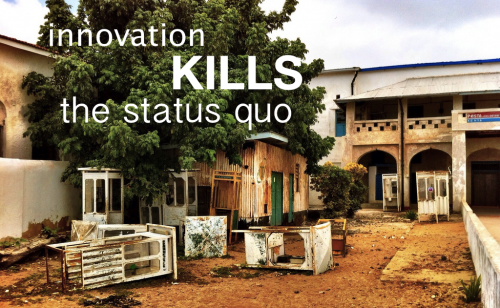This is from a blog post that I wrote for the Skoll World Forum, coming up in a couple weeks, that I titled, “Innovation Comes from the Edges“.
I was recently asked, “how do you find innovators?” It’s an odd question really, one that I hadn’t thought about before, but one that is valuable to think through. You have to dig deeper and think why innovations happen at all, and what the power structures are that make them be identified as innovative. After all, innovation is just a new way of doing things than what is currently the norm.
In any industry, society or business there are status quo powers at play. These are generally legacy structures, setup for a time and place that needed that design. Think big media in broadcasting and print, how has it been disrupted by the internet, mobiles and social media in the last 10 years? How about government? How about the humanitarian space? How about the energy industry?
All of these industries were seen as “innovative” when they came into their own, decades and centuries ago. Now they are legacy in both infrastructure and design, and their relevancy in their current state is in question. By their nature they fight to maintain the power structures that keep them in the position that they hold. Changes to the foundations on which they stand is not only scary, it’s deadly.
Innovation comes from the edges, so it comes as no surprise that innovators are found in the margins. They are the misfits among us, the ones who see and do things differently. They challenge the status quo and the power sources that prop that up, so are generally marginalized as a reflexive and defensive action.
Think about what you’re really asking for when you say you want innovation in your space. Because, when you do, you’re asking for the outliers, the disruptors and the rebels to have their way. You’re asking for a new way of thinking and doing – and if you’re in a position of power within an industry, you’re likely going to be upset along the way.
Innovation and Social Entrepreneurs
I’ve seen my fair share of “social entrepreneurs” as a TED Senior Fellow and a PopTech Faculty Fellow, at the iHub – and of course as a co-founder of Ushahidi I’ve been labeled as one as well.
I’m still not sure that I buy into this term (but that’s a longer discussion for another time).
All successful social entrepreneurs are innovators, though all innovators aren’t social entrepreneurs. This space is being defined as one where the innovation has to be something that empowers the disempowered, strengthens the weak, or enriches the lives of the poor. These are loose boundaries, but ones that allow the subjectivity of founders and funders to define their work. Since it’s fairly new, this works for everyone quite well.
At the end of the day what I do, and what the other social entrepreneurs that I’ve gotten to know over the years do, is disrupt something. Simply put, we’re working from the outside, or the edges of an industry, with less money and less buy in, trying to change the way that it works. Sometimes undermining it entirely, sometimes coming up with new markets and new industries, all in our search for a better way.
On Funding Innovation
Many of the people who say they want change, and aren’t happy with the current solutions found in the world, aren’t actually serious about wanting that change. It’s lip service. There are very few funders and forums for game changers to be heard and for them to find funding to take their idea, product or service to market. The same people who say that they don’t want the same traditional approach, apply traditional ways of thinking to finding and funding innovators.
There is precious little innovation in the funding space, even as these same funders look to find the next organization that will turn the world on its head. In a space overflowing with grand claims of disruption, which funders are actually that themselves? How many “social impact” funders actually fund anything? In the social entrepreneurs world, it’s a lot less painful to get funding from traditional VCs and angels than it is this new social impact investor type.
I can think of a few funding organizations that actually try new things, and can count them on one hand: Skoll, Omidyar Network, Knight, Indigo Trust. I’ve probably missed a couple, but you get the drift, this isn’t an area where people are changing with the times.
